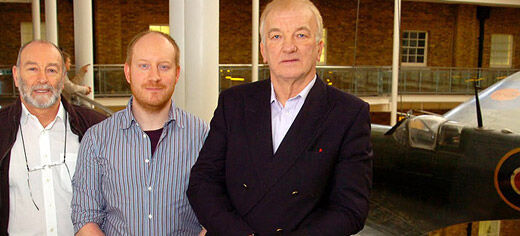
University of Leeds geophysics expertise will be called in to help with the final stage of Lincolnshire aviation enthusiast David Cundall's bid to locate buried Spitfires in Myanmar.
Dr Roger Clark, Senior Lecturer in Geophysics in the University’s School of Earth and Environment, and Dr Adam Booth, a Research and Teaching Associate at Imperial College London (formerly University of Leeds) will lead a geophysical ground investigation in Mingaladon, after which the site will be excavated. It is hoped the dig can take place in January, pending final negotiations with Myanmar officials.
Surveys carried out by Dr Clark and Dr Booth for Mr Cundall over the past 10 years show large areas of electrically conductive material underground. Although it is impossible to say if these are Spitfires, the location and depth of the material corroborates eyewitness reports given to Mr Cundall that Spitfires were buried at this site toward the end of World War II.
Dr Clark, who leads the University’s MSc Exploration Geophysics programme, has advised Mr Cundall for more than 20 years on several projects to detect buried military relics at a number of locations in the UK and overseas.
Dr Booth was formerly a student on this MSc programme and also completed a PhD at Leeds under the supervision of Dr Clark.
In 2004, having achieved his MSc and prior to starting his PhD, Dr Booth had the opportunity to work with Mr Cundall carrying out a survey in Myanmar. During this time they drilled an exploratory hole at the Mingaladon site under the supervision of the Myanmar military.
Dr Booth said: “Not only was this a unique and exciting opportunity at a time when I was still young, but it gave me valuable experience in managing the acquisition side of a geophysical project. I’m glad to see David’s venture progressing this far and I look forward to the final stage.”
Dr Clark said: “This is an enormously interesting project particularly for a geophysicist going into a country that is likely to be investing heavily in its infrastructure in the near future. Myanmar needs its own people to be skilled in understanding the geophysics side of resource exploration and environmental management in order to work with the companies that will go into its markets. In this way, I believe there are opportunities here to help Myanmar get back on its feet.”
Mr Cundall said: “Finding the right people to support me has been one of the most important aspects of this project. The help that Roger and Adam have given me has been invaluable and has helped bring me close to writing the final chapter in this 20 year search.”
As Myanmar moves toward democracy there may be new opportunities to engage with its emerging higher education sector. Mr Cundall has worked with Myanmar organisations on geophysical surveys during the project. The University of Leeds is looking at how it could forge new relationships in the future.
The UK Foreign Office has offered to meet the team when they arrive in Myanmar and to work with the University of Leeds to facilitate the project.
The geophysicists are part of an international team of experts supporting Mr Cundall’s venture, including several conflict archaeologists and the project’s funder, development and production company Wargaming.net.
For more information:
Contact: University of Leeds Communications & Press Office: Tel 0113 343 4031, email pressoffice@leeds.ac.uk